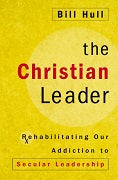 I became something else, something other than what I naturally would have become, by becoming an evangelical pastor. Do not underestimate the difficulty of the task. While I generally agree with evangelical theology, I am at odds with the evangelical subculture and its version of holiness. The office of pastor applied pressure that created in me a Christlike character. If I had not accepted the call, I would not have been changed.
I became something else, something other than what I naturally would have become, by becoming an evangelical pastor. Do not underestimate the difficulty of the task. While I generally agree with evangelical theology, I am at odds with the evangelical subculture and its version of holiness. The office of pastor applied pressure that created in me a Christlike character. If I had not accepted the call, I would not have been changed.
If I had not been a leader, I don’t think I would ever have been challenged to learn to love people the way Christ loves them. I would have felt I had the option of walking away.
Becoming a leader called me to become something else. I was very young then, and I didn’t get all the way there, but I made progress. The church was deeply wounded, a root of bitterness had taken hold, and many were acting out of fear and frustration. In trying to establish an environment of grace and reconciliation, I took on a great deal of criticism. I led meetings with the goal of bringing about reconciliation, only to be accused of taking sides.
Enemies
I had never had enemies before, at least the kind with names and faces, people with whom I had shaken hands and sat across from at church dinners. I always envisioned grand enemies like editors of newspapers, theologians, politicians, and people of importance. Mine were housewives, retired schoolteachers, housewives, insurance salesmen, housewives, janitors, and housewives.
I am sure I would not have reached any kind of Christlikeness without my enemies.
What a gift they were to me. I want to say, “Thank you, enemies. I want to give you a big hug.” Because of their criticism, I got on my knees and prayed, Lord, I am not afraid of any change you want to make in my life.
Being a leader helped me begin to take ownership of the effect I was having on people. I was often driving people rather than leading them, pushing rather than pulling. So the criticism was deserved at times. Yet over time, I learned that leadership was about helping people see that Christ was the treasure, and selling everything to get him was the wisest choice anyone could make.
Steps You Can Take Today
Even though many of the changes in our lives are due to pressures that we don’t choose or expect, we can practice some basic activities to prepare ourselves for change. If you want to nurture transformation, seek God in prayer and in reading Scripture and other literature. Take time to think and pray and talk with others who are on the same journey of discipleship. Keep putting one foot in front of the other, walking in the right direction. Keep breathing spiritually, exhaling the impure and inhaling the pure. Then let life happen. With a seeking heart, you will start hearing from God.
A Prepared Attitude
I call life “the big curriculum.” Most curricula are planned. You know what you are getting into and what the point is. The “big curriculum,” however, is unpredictable. It teaches us faster than any other kind. The important thing is to be ready to learn, and to have a prepared attitude that will turn all of life into a seminar on Christlikeness.
— by Bill Hull, adapted from his new book The Christian Leader: Rehabilitating Our Addiction to Secular Leadership.
How to Use This Book
What if everything you’ve heard about leadership is wrong? Unfortunately, secular models of leadership rooted in pragmatic success dominate Christian leadership; this makes our work impersonal and exploitative. Bill Hull’s book will help you learn to embrace a different way of leading. You will discover how to change the sources of your behavior: your motives and reasons for being a Christian leader. Transformation will follow–in you, and in those you lead and serve.

